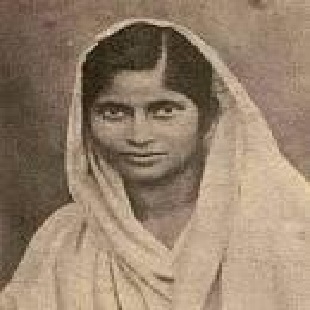
Among women freedom fighters in Odisha, Sarala Devi was perhaps the most iconic one who made an extraordinary impact on the freedom struggle in Odisha. She was also a social activist, feminist, writer and a parent to the poor who was respected by all sections of people till her death in 1986. Born on 9 August 1904 at village Narilo near Balikuda of Jagatsinghpur district in an influential and aristocratic zemindar family she was adopted by her uncle Balmukund Kanungo, a deputy collector under the British government who took every care to raise her in life. When Balmukund was posted in Banki, he arranged a private tutor for her as going to school for a girl in an aristocratic family was a taboo then. She learnt Odia, English, Sanskrit and Bengali from him in her home in which she became master later on. But she was inspired by the story of valour of Rani Suka Dei, the legendary queen of Banki who was a household name there for her patriotism and sacrifice for the motherland. She realized the immensity of women's power which could be used for a combined struggle for freedom. But to stand on equal footing with the men, the women should rise from the chain of restriction and join hands with men. This revolutionary thought from her childhood subsequently gave her spirit to be equal with males. She got married at the age of 14 to Bhagirathi Mahapatra who was an advocate and was a soldier in the freedom struggle. Though the early marriage did not satisfy her, she was fortunate to get a caring husband like Bhagirathi Mahapatra who supported and stood with her in every step of her life. She devoted her energy and potentiality to emancipating the women from their downtrodden position by joining the ‘Mahila Samaj’ sponsored by Lavanyabati Devi. This organization encouraged the women of Odisha to join the Freedom Movement. In 1924, in its provincial conference at Cuttack though a lot of women were seated behind a bamboo curtain and listened to the speeches, Sarala Devi suddenly emerged out of the curtain and delivered a long fierce speech though her act was not appreciated by other women freedom fighters. In 1921, while Mahatma Gandhi was addressing a meeting at the river bed of Kathajodi in Cuttack, nearly 40 women including Sarala Devi attended this meeting. The charisma of Gandhiji’s speech moved the mind and heart of Odia women to such an extent that Rama Devi, Sarala Devi and Kuntala Kumari Sabat donated in free hand to ‘Tilak Swaraj Fund’. During Salt Satyagraha Sarala Devi went to Huma in Ganjam to take part in the Satyagraha. She also founded an ‘Udjoga Mandir’ at Berhampur to make it her battle ground for spreading the activities in Ganjam district. She was arrested by the Berhampur police and sent to Vellore jail. But this arrest raised her public image, as on her way to Vellore by train she was greeted in stations by several people. After her release she formed ‘Nikhila Utkal Parisada’ in which women from all walks of life were included. To educate the women (both socially and politically) she started several dramas by making road shows. In 1933 she along with Nabakrushna Chaudhury attended a huge peasant meeting at Anakhia and encouraged peasants for initiating movement when she was a member of the Odisha Legislative Assembly in 1937. As a legislator she initiated many bills beneficial for the peasants and also through her speech she drew the attention of the government to their problems. She also functioned for some time as speaker of the house. On Gandhi’s visit to Odisha in 1934, she moved from village to village to propagate the ideology of Congress and satyagraha among the Harijans and worked for their uplift and removal of untouchability. She also participated in the Quit India movement in 1942 and was arrested. In the later part of her life she was attracted towards socialism and became an active member in the Utkal Congress Socialist Party in which leaders like Nabakrushna Chaudhury, Malati Chaudhury, Bhagabati Panigrahi were active members. After independence she was not satisfied with the working style of the Congress Party and joined the Praja Socialist Party. She was active in her public life till her death in 1986.